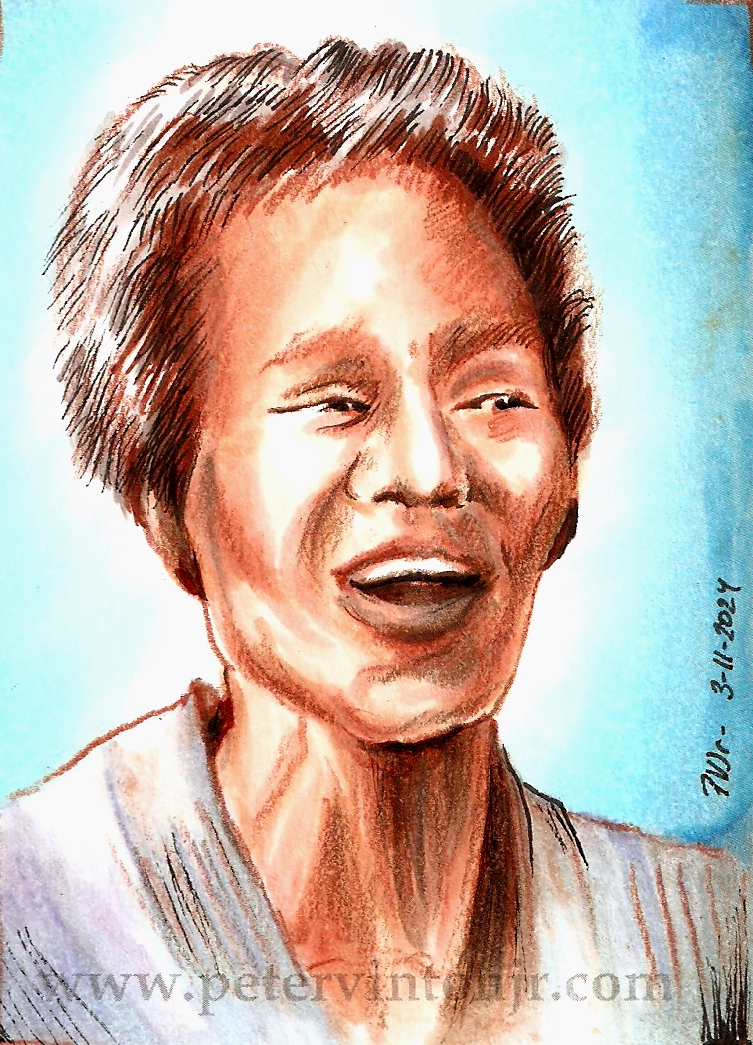Lesson 146:
Hazel Palmer
An ongoing illustrative history study
This piece originally posted 3/11/2024
"If my children are somewhere, I should be where they are and know something about where they are."
 Uncharacteristically for someone of her age at the time, Hazel Palmer immersed herself in the 1960's drive for civil rights ...because her children had done so. The mother of eight, Hazel was drawn into the SNCC after five of her children were arrested in Jackson, Miss. as Freedom Riders.
Uncharacteristically for someone of her age at the time, Hazel Palmer immersed herself in the 1960's drive for civil rights ...because her children had done so. The mother of eight, Hazel was drawn into the SNCC after five of her children were arrested in Jackson, Miss. as Freedom Riders.
Born in 1922 Mississippi, Hazel worked as an elementary school teacher who was mostly unconnected to --and uninterested in-- current events, but her own children's commitment changed all that. Besides working various grassroots get-out-the-vote initiatives and participating in Freedom Schools, she even taught herself how to drive. Later she sued the city of Jackson, Miss. when it opted to close all of its municipal swimming pools rather than desegregate. While a higher court ultimately upheld the closures, Hazel remained a firm activist and advocate.
In 1964 Hazel took her commitment a little further and was part of the organization/founding of what would become the Mississippi Freedom Democratic Party (MFDP), a parallel party that actually represented the interests of Black voters. (See Lesson #51 - Fannie Lou Hamer, Lesson #53 - Ella Baker, and Lesson #112 - Bob Moses, in this trading card series for more about the MFDP and some of its other key founding members.) That year, at the Democratic National Convention in Atlantic City, the DNC's Credentials Committee offered a mere two seats to the MFDP and tacked on the stipulation that they would decide who those delegates would actually be and that those named delegates would be expected to take an oath of party loyalty --unfortunately this was the "compromise" offer. Regretfully the MFDP leadership (including Hazel, who had already annoyed the DNC organizers by leading a spontaneous chorus of "We Shall Overcome" from the convention floor) rejected this offer, and they ultimately went unrepresented. Mississippi went on to be represented by an all-white delegation and the party ultimately nominated the incumbent, President Lyndon Johnson. But this commitment to principle stayed with Hazel, and for the rest of her life she fiercely pushed for reform, voting rights, and ending discriminatory laws and ordinances.
Learn a great deal more about the MFDP at: https://snccdigital.org/events/mfdp-founded/
Read a thoroughly engrossing first-person interview with Palmer at: https://stacks.stanford.edu/file/druid:ws245qj9293/ws245qj9293.pdf (14-page PDF file)
"I know I'm not free and I don't expect to get free, other than the freedom I feel in myself. It's just a long journey and we've got to keep working."
Next page - Lesson 147: Sarah Boone
Return to www.petervintonjr.com Main Page
 Uncharacteristically for someone of her age at the time, Hazel Palmer immersed herself in the 1960's drive for civil rights ...because her children had done so. The mother of eight, Hazel was drawn into the SNCC after five of her children were arrested in Jackson, Miss. as Freedom Riders.
Uncharacteristically for someone of her age at the time, Hazel Palmer immersed herself in the 1960's drive for civil rights ...because her children had done so. The mother of eight, Hazel was drawn into the SNCC after five of her children were arrested in Jackson, Miss. as Freedom Riders.